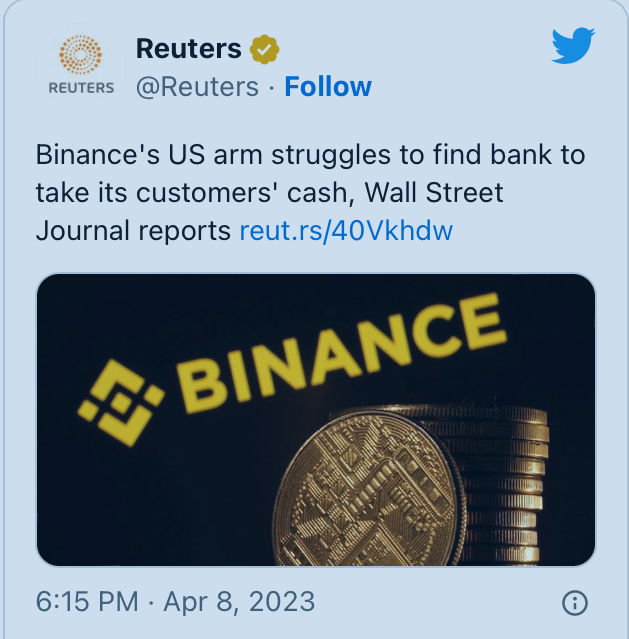Binance US struggles to find a new banking partner to handle cash deposits.
The refusal of banks to work with Binance U.S. is primarily due to the regulatory landscape.
Investors pulled $1.6 billion from Binance when the CFTC sued Binance and C.Z.
A recent tweet states that Binance’s U.S. division faces challenges finding a suitable new banking partner. The objective is to see a financial institution that can securely handle the cash deposits made by Binance users.
Binance’s U.S. arm is actively searching for a new banking partner after the recent collapse of two crypto-friendly banks, Signature Bank and Silvergate Bank. These banks had previously been responsible for handling the cash deposits made by Binance users in the United States. The search for a new financial partner aims to find a secure and reliable institution that can effectively manage the deposit funds made by Binance users in the U.S.
According to reports, Binance has tried to come to agreements with numerous banks in the U.S. However, the largest cryptocurrency exchange platform by market cap has received reluctant messages from the banks. Some of the banks that Binance U.S. has reached recently are the Cross River Bank and Customers Bancorp Inc.
The refusal of banking partners to work with Binance U.S. is primarily due to the current regulatory landscape surrounding digital currencies in the country. The regulations were tightened after the collapse of FTX, where the CEO, Sam Bankman-Fried (SBF), was found to have misused customer funds. This event led to a regulation shift, making banks more cautious about partnering with cryptocurrency companies like Binance.
CFTC Sues Binance U.S. and Changpeng Zhao
Last month, the U.S. Commodity Futures Trading Commission (CFTC) sued Binance along with its CEO Changpeng Zhao (C.Z.) and former top compliance executive, alleging that they were operating an “illegal” exchange and a “sham” compliance program.
Investors have pulled $1.6 billion out of Binance since the lawsuit. It is unclear how the legal action would affect Binance’s future operations, but it has undoubtedly heightened scrutiny of the exchange.

